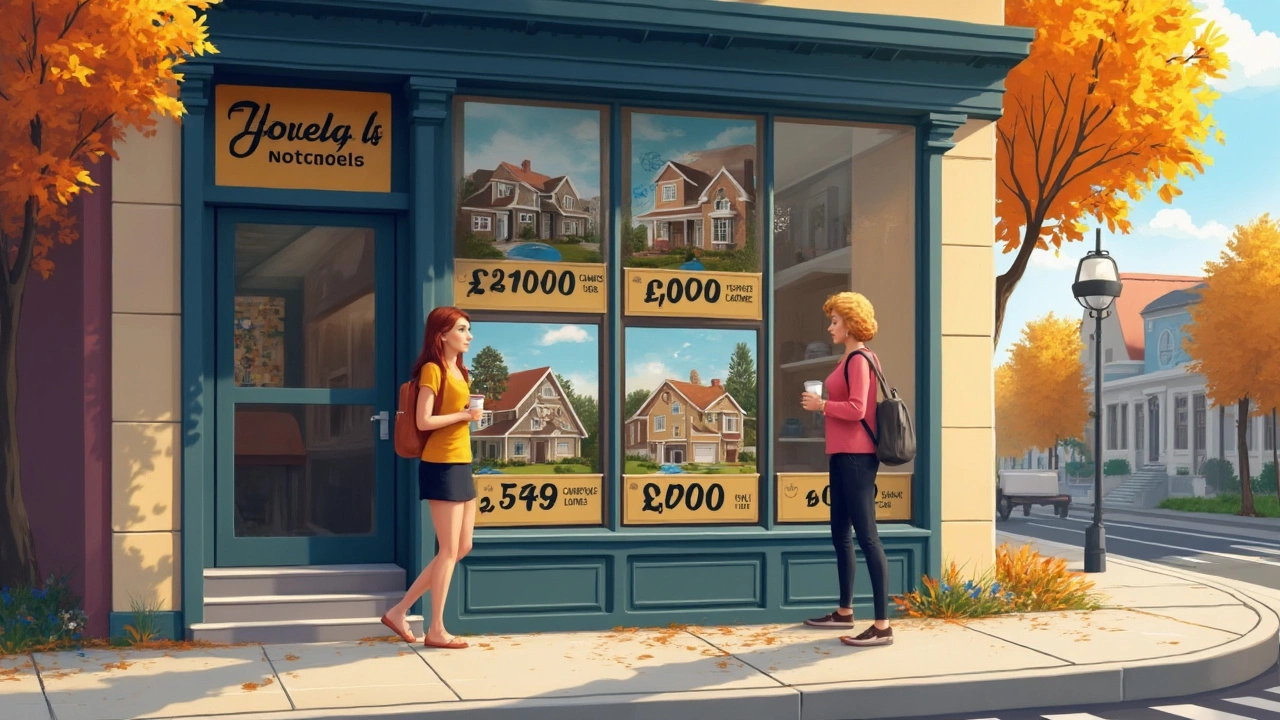Thinking about buying your very first home in North Carolina? That's a huge milestone! But before you start imagining yourself on that front porch with a sweet tea, a bit of prep work is needed. The process might seem complex, but don't worry, you're not alone. Let's break it down into simple steps to help you qualify as a first-time home buyer.
First things first, understanding if you actually count as a 'first-time' buyer is crucial. It's not always your first rodeo—maybe you haven't owned a home in the last three years, or perhaps you never have. Good news, you could still qualify!
Money talks, and your budget matters. You'll want to get a handle on your expenses and income. Figure out what you can afford month-to-month after accounting for a mortgage. This isn't just about numbers but also about feeling secure and avoiding that panicky end-of-month crunch.
- Understanding Eligibility Requirements
- Financial Readiness and Budgeting
- NC-Specific Homebuyer Programs
- Navigating Credit Score Needs
- Making Use of Professional Advice
Understanding Eligibility Requirements
The first step to becoming a first-time home buyer in NC is nailing down those eligibility requirements. So, who counts as a first-time buyer? Well, it might surprise you—it's not always your very first home purchase. If you haven’t owned a home in the last three years, you could still be considered a newbie in the eyes of many programs. Nice loophole, right?
Next, North Carolina has its own twists when it comes to eligibility. Some local programs have specific conditions about where you plan to buy. Cities or counties might offer their own assistance, but they tend to focus on helping residents in certain areas. It's a good idea to check out what your target city or county offers—you might find some hidden gems.
Income Limits
What's your household income like? Many first-time buyer programs in North Carolina set income limits. They want to make sure help goes to those who need it most. As a rough guide, the limits often correlate with local median incomes, which means they might vary depending on where you are. Double-check with local resources or housing authorities to keep things on track.
Down Payment Assistance
The down payment can feel like a mountain, but don't lose heart! North Carolina has several programs to help with down payments and closing costs. To qualify, you might need to attend some housing counseling or have your loan approved through an eligible lender. These programs ensure you're ready and raring to hit the ground running when you close.
Here’s a snapshot of a few programs:
- NC Home Advantage Mortgage offers down payment assistance of up to 5% of the loan amount.
- Community Heroes program, designed for educators, firefighters, law enforcement, and medical staff, provides extra benefits.
- Self-Help Credit Union partners with home buyers for affordable mortgage options tailored for those with lower incomes.
Credit Requirements
Your credit score matters too. A lot of the state programs expect a score of around 640 or higher, which is pretty standard. If you’re not there yet, it might be a good idea to work on improving your credit by paying down debts and checking your credit report for errors.
Getting familiar with these eligibility requirements sets you up for success and helps you find the right assistance and programs tailored to your needs. Armed with this knowledge, you're starting off strong on your path to homeownership!
Financial Readiness and Budgeting
Before diving headfirst into the North Carolina housing market, you need to get your financial ducks in a row. It's tempting to jump straight to house hunting, but laying a solid financial foundation is key to actually qualifying as a first-time home buyer.
Assess Your Current Financial Situation
Start by taking a good, hard look at your current financial picture. This means tracking every dollar that comes in and goes out. Pay attention to your net income, regular expenses, and any outstanding debts. A clear understanding of these figures is essential.
Create a Realistic Budget
Once you have a handle on your finances, it's time to figure out how much house you can actually afford. This means setting up a budget that includes not just the mortgage, but property taxes, insurance, and maintenance costs too. A lot of folks use the 28/36 rule—spending no more than 28% of their gross monthly income on housing and 36% on total debts.
Boosting Your Savings
Let's talk savings. Ideally, you'd want a solid cushion for a down payment and any unexpected expenses along the way. North Carolina has various programs that offer assistance, but having your own savings adds a layer of safety. Consider setting up an automatic transfer to your savings account every month.
Down Payment Assistance Programs in NC
If saving up seems daunting, don't worry. North Carolina offers several down payment assistance programs tailored for first-time home buyers. These programs often require a certain credit score and income level, but they can significantly reduce the burden of initial costs.
| Program | Assistance Amount | Eligibility |
|---|---|---|
| NC Home Advantage Mortgage | Up to 5% of loan amount | For applications with a credit score of 640 or higher |
| NC 1st Home Advantage Down Payment | $8,000 | Specifically for first-time buyers or military veterans |
Mind Any Debts
Debt is tricky but manageable. Pay off small debts to reduce the overall load, and tackle larger ones systematically. Keeping your debt-to-income ratio low not only potentially improves your credit score but also your chances with lenders.
By getting financially fit, you're well on your way to being in a position to snag that dream home in NC. Stay disciplined, informed, and keep your eyes on the prize—a place you can really call your own.

NC-Specific Homebuyer Programs
If you're looking to become a first-time home buyer in NC, you're in luck. The state offers some pretty sweet deals to help ease the process. So, what's out there?
The NC Home Advantage Mortgage
Let's start with the NC Home Advantage Mortgage. This program offers down payment assistance up to 5% of the loan. It's a lifesaver if you're short on savings but ready to own a home. The kicker? It's not just for new constructions—you can use it for existing homes too.
Community Partners Loan Pool
Next, we've got the Community Partners Loan Pool, meant for low-to-moderate income households. This program gives even more down payment help, often combined with personal advising to make sure you're buying smart.
NC 1st Home Advantage Down Payment
If you truly are a first-timer, the NC 1st Home Advantage Down Payment is another stellar option. The program provides a whopping $8,000 for your down payment. However, it's designed for those below a specific income threshold, so check if you qualify.
How to Apply
Applying for these programs is pretty straightforward. You'll need to contact a participating lender who can help determine your eligibility and guide you through the process. It's not rocket science, but having someone in your corner doesn't hurt.
Important Considerations
Remember, each program has its quirks, so read the fine print. Sometimes there's a catch like a residency requirement or a cap on purchase price. Don't brush these off; they're crucial for deciding what's best for your situation.
Take a look at this summary of some NC programs:
| Program | Benefit | Eligibility |
|---|---|---|
| NC Home Advantage Mortgage | Up to 5% down payment assistance | Income limits |
| Community Partners Loan Pool | Additional down payment help | Income and housing partner requirements |
| NC 1st Home Advantage Down Payment | $8,000 for first-timers | First-time status and income limits |
These NC-specific homebuyer programs are incredibly helpful and open doors you might not have realized were within reach. Make sure to hit up a lender who knows the ropes and can explain which program fits your deal. Home ownership in NC is totally doable with these tools in your belt.
Navigating Credit Score Needs
Your credit score can feel like this elusive number, but it's super important when you're trying to qualify as a first-time home buyer in NC. It tells lenders whether you’re good for the money or not. So, what's a good score?
Generally, you'll need a score of at least 620 for a conventional loan, but if you're eyeing an FHA loan, you might get away with around 580. Higher scores, like anything above 700, can seriously hike up your chances for better interest rates, which equals more savings for you.
So, how do you even find out your credit score? You can pull a free report from places like AnnualCreditReport.com. It's like checking your test scores, but without the sweaty palms since it's free!
Simple Tips to Boost Your Score
- Pay your bills on time. Like, every single one. A late payment can ding your score pretty quick.
- Reduce any high card balances. Try to keep that below 30% of your limit.
- If you’ve got any old credit accounts, keep them open—you want that good credit history to shine.
And if your credit is less than stellar right now, don't panic. Improvement takes time, but it’s definitely doable. Consider this a marathon, not a sprint.
| Loan Type | Minimum Credit Score |
|---|---|
| Conventional Loan | 620 |
| FHA Loan | 580 |
Ultimately, understanding and managing your credit score is a crucial step towards getting those house keys in hand. So, keep an eye on it and remember—every point counts!

Making Use of Professional Advice
When you're stepping into the world of home buying in NC, professional advice can be your best friend. But who should you turn to? Let’s break it down so you know exactly who to call when you’re ready to make that leap.
Real Estate Agents
A good real estate agent can be a game-changer. They know the local market inside out and can help you find properties that fit your criteria. They’re pros at negotiating deals and can give you insights into neighborhoods. Be sure to choose someone who’s experienced with first-time home buyer scenarios; it makes a difference!
Mortgage Brokers
Getting your financing in order is a big part of buying a home. A mortgage broker can shop around for the best loan offers and explain terms in plain language. Plus, they'll help you compare rates, which can save you a ton of money in the long run. Remember, the goal is to snag a loan that's affordable and easy to manage.
Home Inspectors
Nobody wants hidden surprises after moving into their new house. A certified home inspector will check the property’s condition and pinpoint potential issues that might not be visible to the naked eye. Investing in an inspector can save you from costly repairs down the line.
Financial Advisors
A financial advisor can help you set a budget that works for your lifestyle. They’ll assist in making sure you’ve got enough saved for a down payment and closing costs, while still keeping an emergency fund. Talk about peace of mind!
Legal Aid
Though not always necessary, a real estate attorney can review contracts before you sign to ensure everything is above board. This adds an extra layer of protection in the home buying process.
Here's a quick tip: Consider creating a checklist of professionals you might need and have preliminary conversations with a couple in each category before deciding who feels right for you.
